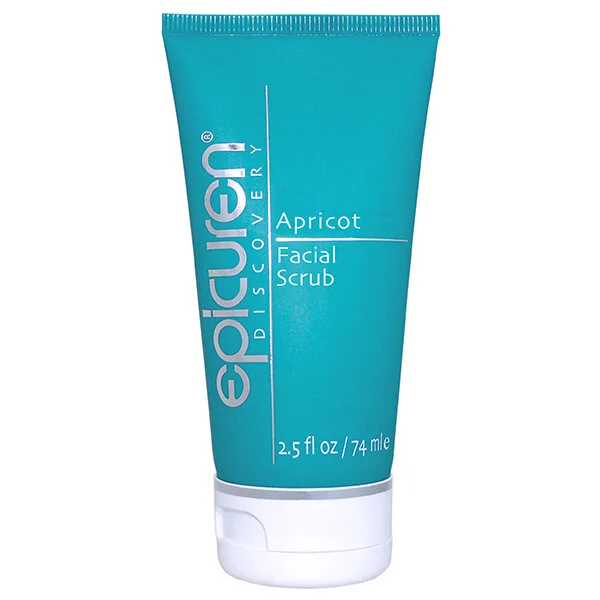Apricot Facial Scrub
Apricot Facial Scrub
Size and Item Number | 2.5oz. | E101-2
Primary Function | An emollient, hydrating scrub designed specifically for dry and mature skin types. Finely ground and polished apricot seed and walnut shells slough away surface dryness and debris to reveal a smooth and fresh complexion.
Recommended For | For dry and normal skin types.
Primary Skin Conditions | Dehydrated, aging sun damage.
Category | Exfoliants ∙ Scrubs
Featured Ingredients:
Prunus Armeniaca (Apricot) Kernel Powder | Finely ground and polished apricot seed granules used to gently remove dead skin cells and exfoliate the skin without irritation.
Juglans Regia (Walnut) Shell Extract | Finely ground and polished walnut shell granules used to gently remove dead skin cells and exfoliate the skin without irritation.
Prunus Armeniaca (Apricot) Kernel Oil | A non-greasy emollient oil, that mimics the skin’s NMF and is rapidly absorbed. Apricot oil has a high Vitamin E content; it can aid in retaining the skin's elasticity, clarity, and suppleness. It is comprised of approximately 75% oleic and 20% linoleic omega fatty acids.
Simmondsia Chinensis (Jojoba) Seed Oil | A non-comedogenic, emollient oil that closely resembles the skin’s sebum. The oil is easily absorbed by the skin and is beneficial for most skin types.
General Theory [Home Care Exfoliation] | While professional treatments are very important, an effective home care regime is essential for a lasting result. Exfoliation will help improve fine lines, dehydration, photo-damage, skin texture, and scarring, and minimizes the appearance of pores while increasing the skin’s ability to absorb products.
As we age, our intercellular glue becomes denser; therefore, the corneocytes are less likely to shed. It can take as long as 75 days for the desquamation process to complete, rather than the ideal 35 days. Furthermore, every 10 years desquamation slows by 7%. Congestion, acne, pigmentation, and aging skin in general require more exfoliation. Acneic skin produces 4-5 times more skin cells than healthy skin. Using the correct method of exfoliation in the right balance is a main component to achieving radiant skin.
Manual/Physical Exfoliators ∙ Best suited for normal/combination and congested skin. The use of granules, such as jojoba beads, and/or brushes loosens and removes the top layer of corneocytes.
Hydroxy Acids ∙ Best suited for oily, acneic, aging, or sun damaged skin types. AHA’s are naturally occurring acids from foods for example; Glycolic (sugar), Lactic (milk or sugar), Malic (unripe apples), Mandelic (almonds), Tartaric (grapes and bananas). Beta Hydroxy Acid (Salicylic Acid) is derived from Willow Bark and is different from an AHA because of its solubility, AHA’s are water soluble and dissolve the intercellular glue, while the BHA is oil and lipid soluble and can dissolve the intercellular glue in addition to having the ability to penetrate the pore and dissolve oil and sebum. Typically, products with a low % of AHA, up to 10% are directed to be used 2 - 3 times per week. For more dramatic results, AHA’s can be used daily until results become evident, and then reduce application to 1 – 2 times per week to maintain results. The pH of Hydroxy Acid products is usually 3 – 3.5. Often times the skin’s pH level varies. If the skin’s pH level is a bit higher, the effects of the acid will be felt more, possibly bringing about a tingling sensation. The use of Hydroxy Acids creates a thinner corneum, which will reflect more light, giving the skin a more vibrant, youthful appearance.
Enzymatic Exfoliators ∙ Best suited for all skin types including sensitive and ethnic. Unlike hydroxy acids, enzyme exfoliation is not occurring due to pH levels. The enzymes dissolve and digest the cells and intercellular glue as the result of a chemical reaction. This method has the least potential for irritation.
Retinoids ∙ Best suited for sun damaged, aging, and acneic skin. Retinoids are recommended in a low dose, for periodic use. Retinol uses enzymes in the skin cells to convert this whole molecule vitamin A into Retinoic Acid. Retinoic Acid encourages communication between the cells, so the aging cells continue the renewal process (desquamation). Its benefits also include reducing P. Bacteria and increasing collagen production.
pH | 6.5
Application | After cleansing, apply a dime size amount of scrub to damp skin and work in gentle circular motions on face, neck, and décolleté areas. Do not rub harshly or use a washcloth. Rinse thoroughly. Follow with toner.
Note: Scrub should not be used more than three times per week.
Companion Products | The Apricot Facial Scrub partners well with the Apricot Cream Cleaner and Herbal Cleanser. To further enhance skin hydration, Epicuren® recommends retailing this scrub with one of the Specialty ∙ Hydrator products such as the Bulgarian Rose Otto. The Apricot Facial scrub can also be found in the Six-Step System.
Notes | Always perform a 24-hour patch test for all products.
Ingredients | Water (Aqua), Prunus Armeniaca (Apricot) Seed Powder, Juglans Regia (Walnut) Shell Extract, Avena Sativa (Oat) Kernel Meal, Palm Alcohol, Caprylic/Capric Triglyceride, Cetearyl Alcohol, Glycerin, Beta Vulgaris (Beet) Root Extract, Sodium Lauroyl Methyl Isethionate, Prunus Armeniaca (Apricot) Kernel Oil, Tocopheryl Acetate, Cocamidopropyl Betaine, 1,3 Propanediol, Simmondsia Chinensis (Jojoba) Seed Oil, Aloe Barbadensis (Aloe) Leaf Juice, Citrus Grandis (Grapefruit) Seed Extract, Rosmarinus Officinalis (Rosemary) Leaf Extract, Arctostaphylos Uva Ursi Leaf Extract, Ceteareth 20, Salvis Officinalis (Sage) Extract, Sea Kelp Powder, Micro Silver, Ethylhexylglycerin, Xanthan Gum, Hydrogenated Soy Polyglycerides, Carthamus Tinctorius (Safflower) Oil, Piroctone Olamine, Phenoxyethanol.

